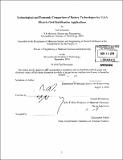Technological and economic comparison of battery technologies for U.S.A electric grid stabilization applications
Author(s)
Fernandez, Ted (Ted A.)
DownloadFull printable version (15.87Mb)
Other Contributors
Massachusetts Institute of Technology. Dept. of Materials Science and Engineering.
Advisor
Donald R Sadoway.
Terms of use
Metadata
Show full item recordAbstract
Energy storage can provide many benefits to the electric grid of the United States of America. With recent pushes to stabilize renewable energy and implement a Smart Grid, battery technology can play a pivotal role in the advancement of energy storage of the grid. While there are many types of batteries that have been brought to market in recent years, four commonly mentioned practical systems are sodium sulfur, flow batteries, long life lead acid, and lithium ion batteries. A new type of battery, the "liquid metal battery" boasts low cost and easy maintenance while also providing superior power and capacity. However, this technology is still in its developmental stage. This study implements a framework for analyzing these five technologies for implementation in real-life scenarios. Firstly, a technological comparison of battery types and application requirements is conducted in order to see which technology is best suited for different applications. Next, an in depth cost analysis is done for each technology, so they can be compared on a total cost of ownership (#/kWh cycled) basis. Lastly, each technology is evaluated for each application through a financial analysis. This analysis encompasses current estimates on market valuation and provides net present values of investments for each battery type and application.
Description
Thesis (M. Eng.)--Massachusetts Institute of Technology, Dept. of Materials Science and Engineering, 2010. Cataloged from PDF version of thesis. Includes bibliographical references (p. 109-110).
Date issued
2010Department
Massachusetts Institute of Technology. Department of Materials Science and EngineeringPublisher
Massachusetts Institute of Technology
Keywords
Materials Science and Engineering.